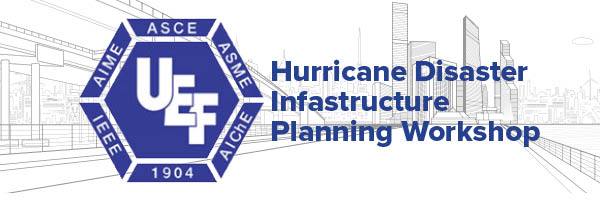
AIChE received a grant from the United Engineering Foundation (UEF) to hold two, multi-disciplinary workshops on hurricane disaster relief and resiliency.
Workshop 1, Houston, TX, March 20-21, 2018
Workshop 2, Madison, WI, July 25-26, 2018
Hurricane Resiliency Roadmap
Hurricane Resiliency Summary Packet
In the wake of last year’s hurricane disasters impacting the lives of many Americans, the media highlighted the need for more preparedness and better adapted infrastructure to mitigate the impact of future catastrophes.
AIChE received a grant from the United Engineering Foundation (UEF) in January 2018 to support two high-level, multi-disciplinary roadmapping workshops on hurricane disaster relief and resiliency. The objective of these workshops is to convene all of the key engineering professions to develop a roadmap highlighting the key areas, that if addressed through engineering, would improve both our preparedness as well as our recovery from hurricanes.
The first workshop, which took place in Houston, TX, on March 20–21, 2018, involved participation from many engineering societies. During this workshop, participants identified some of the more immediate needs to optimize, redesign, and complete new resilient infrastructures in the affected areas as well as laid the framework for the overall roadmap.
Representatives and members from all of the key engineering professional societies were involved. These are: the American Institute of Mining, Metallurgical, and Petroleum Engineers (AIME), the Society for Mining, Metallurgy, and Exploration (SME), the Minerals, Metals, and Materials Society (TMS), the Association for Iron & Steel Technology (AIST), the Society of Petroleum Engineers (SPE), the American Society of Mechanical Engineers (ASME), and the Institute of Electrical and Electronics Engineers (IEEE). In addition, industry, academia, and government were all represented at the first workshop.
The first workshop revealed that we have a long way to go before hurricanes do not wreak havoc on society, especially those societies near the coastline. Infrastructure design and construction, communication protocols and technology, and policy will all play a role.
The second workshop, which took place in Madison, WI, on July 25–26, 2018, convened members of the broad engineering societies with a particular focus on bringing working engineers together to add more detail to the engineering issues and potential solutions identified during the first workshop.
Participants in this workshop spanned geographies, from Puerto Rico to Texas, and included engineers working in industries and disciplines relevant to designing and building resilient infrastructure. Engineers and scientists presented their work to address critical issues affecting hurricane resilient infrastructure, including several presentations on modeling and simulation.
The presentations, small-group brainstorming sessions, and open discussions at these two workshops will form the basis for a white paper and roadmap that engineers can use to identify where they should focus their efforts to reach an ideal society in which hurricanes do not cause disaster.
Available Presentations:
Wind hazards building loads in the context of community resilience by John van de lindt
The role of geospatial data analysis by Ruth Trujillo Rodriguez
Puerto Rico's waste management infrastructure by Hanna Rodriguez Moralez
Predicting wind hurricane hazard under changing climate conditions by Michele Barbato
Interdisciplinary assistance for homeowners' wind protection decisions by Rodrigo Castillo
